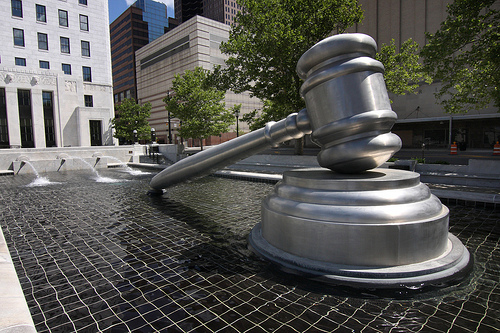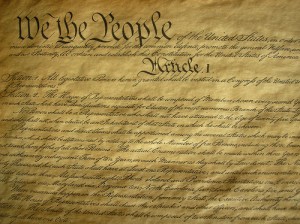Constitution
Obamacare: split decision

The key part of Obamacare, the Minimal Coverage Mandate, came to two separate courts of appeals today. Each court had to consider how far the executive branch of government may go to rewrite a law. One court, or at least one three-judge panel, showed courage. They ruled in line with the Constitution. The other panel behaved like cowards. They handed down a specious decision in the government’s favor. In so doing they made a split between two judicial circuits. Once again the Supreme Court of the United States must contend with an issue they earlier tried to punt.
The Obamacare mandate won’t work
At issue is whether holders of Obamacare policies, in States that do not have their own health-insurance exchanges, may get subsidies from the federal government to cover their premiums. Under the Obamacare law as the Senate passed it (and the House “deemed it passed”), the answer is: no. Only those who buy policies on a State-run exchange may claim these subsidies. The problem: without them, those policyholders will see their premiums nearly double. And the doubling will happen during the upcoming midterm elections.
The U.S. Internal Revenue Service has, since de facto President Barack Obama took office, made itself the most explicitly political tax agency in the world. Zacchaeus, the notorious publican whom Jesus Christ reformed, could learn a thing or two about political tax gathering, not to mention fraud, from this IRS:
If I have “shown the fig” on anyone, as I know I have, I will pay him back four times as much!
Luke 19:8
The IRS decided, on its own authority, to grant certain tax credits to any business taxpayer, regardless of what State he lived in, according to its own rules.
Two sets of plaintiffs sued the government to demand the government:
- Treat them equally under the law, and
- Obey the letter of the law.
In other words: stop handing out tax credits, seemingly on a whim, and claim authority that the Obamacare law didn’t give it.
Two courts, two rulings
The Court of Appeals for the District of Columbia ruled in the case of Halbig v. Burwell that the IRS, and the Department of Health and Human Services, had no legal authority to do what they did. The Associated Press summed up the ruling:
The majority opinion concluded that the law, as written, “unambiguously” restricts subsides to consumers in exchanges established by a state. That would invalidate an Internal Revenue Service regulation that tried to sort out confusing wording in the law by concluding that Congress intended for consumers in all 50 states to have subsidized coverage.
The Obama administration said in essence they would hand out the tax credits anyway. They said this though the D. C. Circuit did not stay their ruling pending any appeal. In fact the Court said:
We reach this conclusion, frankly, with reluctance. At least until states that wish to can set up Exchanges, our ruling will likely have significant consequences both for the millions of individuals receiving tax credits through federal Exchanges and for health insurance markets more broadly. But, high as those stakes are, the principle of legislative supremacy that guides us is higher still. Within constitutional limits, Congress is supreme in matters of policy, and the consequence of that supremacy is that our duty when interpreting a statute is to ascertain the meaning of the words of the statute duly enacted through the formal legislative process. This limited role serves democratic interests by ensuring that policy is made by elected, politically accountable representatives, not by appointed, life-tenured judges.
By writing those lines, Judge Thomas Griffith delivered the sharpest, most stinging rebuke any federal judge could have made to all the rest of the federal judiciary. He actually said respecting the legislature is more important than saving Obamacare. (See also Guy Benson’s not-quite-blog on the Obamacare legal developments at townhall.com.)
Still, the Obama administration will likely skate on their effective repeat of President Andrew Jackson’s famous line:
Judge Marshall has made his decision. Now let him enforce it.
Because the Court of Appeals for the Fourth Judicial Circuit, in Richmond, Virginia, in the cases of King v. Burwell, ruled exactly the opposite way.
CNBC keeps a page having embeds of both decisions. The decision in the King case relies on obscure case law, so CNAV cannot cite one paragraph to sum up the court’s reasoning. This much, CNBC missed: the federal government made a legally shaky case for their rewrite of the statue. And the Fourth Circuit Court of Appeals knows it. Yet they found for the government anyway. Their reasoning is as specious as it is convoluted. Judge Griffith’s ringing opinion in Halbig would make this abundantly clear.
So Obamacare will still keep its subsidies. The IRS will likely say they are not so much defying the D. C. Circuit as obeying the Fourth Circuit.
The administration will appeal the Obamacare ruling in the D. C. circuit to the full, eleven-member panel. That is, they will ask that court to sit en banc. The reason: if the full bench of the D. C. Circuit agrees with them, they will also agree with the Fourth Circuit. The circuits, therefore, will agree. That makes a Supreme Court challenge less likely. But if David King and his fellow plaintiffs also ask the Fourth Circuit Court to sit en banc, they could split the circuits all over again.
But this circuit split shows, more than anything else, that judges make political decisions, the same as legislators and executives do. Today one court showed courage; the other cowardice and corruption.
[subscribe2]
Terry A. Hurlbut has been a student of politics, philosophy, and science for more than 35 years. He is a graduate of Yale College and has served as a physician-level laboratory administrator in a 250-bed community hospital. He also is a serious student of the Bible, is conversant in its two primary original languages, and has followed the creation-science movement closely since 1993.
-

 Civilization3 days ago
Civilization3 days agoWhy Europe Shouldn’t Be Upset at Trump’s Venezuelan Actions
-

 Executive4 days ago
Executive4 days agoHow Relaxed COVID-Era Rules Fueled Minnesota’s Biggest Scam
-

 Christianity Today3 days ago
Christianity Today3 days agoSurprising Revival: Gen Z Men & Highly Educated Lead Return to Religion
-

 Civilization4 days ago
Civilization4 days agoThe End of Purple States and Competitive Districts
-

 Executive4 days ago
Executive4 days agoWaste of the Day: Can You Hear Me Now?
-

 Executive5 days ago
Executive5 days agoWaste of the Day: States Spent Welfare in “Crazy Ways”
-

 Civilization2 days ago
Civilization2 days agoDeporting Censorship: US Targets UK Government Ally Over Free Speech
-

 Executive2 days ago
Executive2 days agoWaste of the Day: Wire Fraud, Conflicts of Interest in Connecticut
















[…] Obamacare: split decision […]